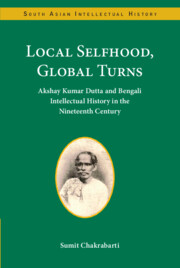 Local Selfhood, Global Turns
Local Selfhood, Global Turns Published online by Cambridge University Press: 30 June 2023
In order to know and understand the world of Akshay Dutta, it is imperative to comprehend the complex social and cultural milieu that he inhabited. Many and various discourses had come together in an uneasy confluence to delineate both the quotidian and the intellectual lives of Calcutta in the nineteenth century. As David Kopf writes:
… varieties of Western ideas seemed to flow easily into the port of Calcutta, which was the capital of British India and a veritable laboratory of intercivilizational encounter between the East and the West. Radical ideas that challenged the bases of the traditional world order in Europe and America were a form of intellectual cargo unloaded on the docks of the great metropolis, along with other industrial and commercial products.
To attempt to write about Akshay Dutta's milieu is to first try and understand, at least in a broad and general way, some of the major strands of intellectual influence that marked the mind of the thinking person in nineteenth-century Calcutta. Between the beginning and the middle of the century, Calcutta had culturally and intellectually become almost as busy as London with the proliferation of printing and publishing establishments, the abundance of western scientific, philosophical, and literary matter, public libraries, English and vernacular newspapers, and cultural, literary, and social associations of various nature and inclination. Contained within the colonial logic itself was a culture of debate and discussion that involved both the ruler and the ruled in a way that was curiously set aside from the general narrative of colonial administration and its major decision-making processes. This is not to say, however, that these debates and discussions had little or no impact on the administrative policies of the colony. The mechanism of colonization was in many ways a symbiotic process, an ‘intercivilizational encounter’, as Kopf would put it. Therefore, there would be frequent interfaces, subtle adjustments, and careful tweaking of policy decisions keeping in mind the cultural, educational, and religious preferences of the native subject, so that the larger structure of colonial governance could remain intact. With the proliferation of printing presses, the increased circulation of newspapers, the general spread of enlightenment education beginning with the primary school, and the coming together of many and different ideological paradigms, the bhadralok class of the city was suitably busy forming and disseminating opinions about every matter of lived experience.
To save this book to your Kindle, first ensure [email protected] is added to your Approved Personal Document E-mail List under your Personal Document Settings on the Manage Your Content and Devices page of your Amazon account. Then enter the ‘name’ part of your Kindle email address below. Find out more about saving to your Kindle.
Note you can select to save to either the @free.kindle.com or @kindle.com variations. ‘@free.kindle.com’ emails are free but can only be saved to your device when it is connected to wi-fi. ‘@kindle.com’ emails can be delivered even when you are not connected to wi-fi, but note that service fees apply.
Find out more about the Kindle Personal Document Service.
To save content items to your account, please confirm that you agree to abide by our usage policies. If this is the first time you use this feature, you will be asked to authorise Cambridge Core to connect with your account. Find out more about saving content to Dropbox.
To save content items to your account, please confirm that you agree to abide by our usage policies. If this is the first time you use this feature, you will be asked to authorise Cambridge Core to connect with your account. Find out more about saving content to Google Drive.